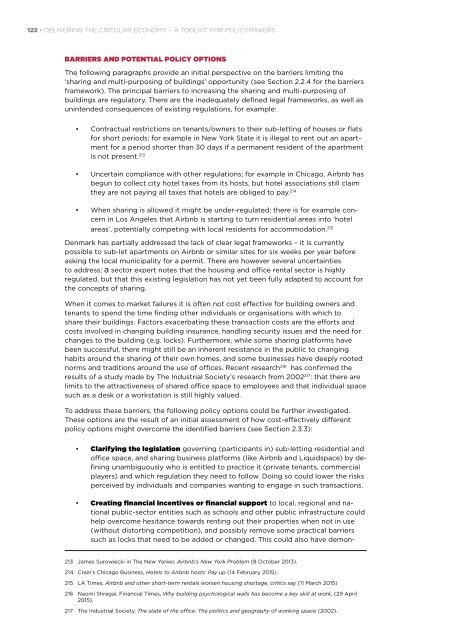DELIVERING THE CIRCULAR ECONOMY A TOOLKIT FOR POLICYMAKERS
20150924_Policymakers-Toolkit_Active-links
20150924_Policymakers-Toolkit_Active-links
You also want an ePaper? Increase the reach of your titles
YUMPU automatically turns print PDFs into web optimized ePapers that Google loves.
122 • <strong>DELIVERING</strong> <strong>THE</strong> <strong>CIRCULAR</strong> <strong>ECONOMY</strong> – A <strong>TOOLKIT</strong> <strong>FOR</strong> <strong>POLICYMAKERS</strong><br />
BARRIERS AND POTENTIAL POLICY OPTIONS<br />
The following paragraphs provide an initial perspective on the barriers limiting the<br />
‘sharing and multi-purposing of buildings’ opportunity (see Section 2.2.4 for the barriers<br />
framework). The principal barriers to increasing the sharing and multi-purposing of<br />
buildings are regulatory. There are the inadequately defined legal frameworks, as well as<br />
unintended consequences of existing regulations, for example:<br />
• Contractual restrictions on tenants/owners to their sub-letting of houses or flats<br />
for short periods; for example in New York State it is illegal to rent out an apartment<br />
for a period shorter than 30 days if a permanent resident of the apartment<br />
is not present. 213<br />
• Uncertain compliance with other regulations; for example in Chicago, Airbnb has<br />
begun to collect city hotel taxes from its hosts, but hotel associations still claim<br />
they are not paying all taxes that hotels are obliged to pay. 214<br />
• When sharing is allowed it might be under-regulated; there is for example concern<br />
in Los Angeles that Airbnb is starting to turn residential areas into ‘hotel<br />
areas’, potentially competing with local residents for accommodation. 215<br />
Denmark has partially addressed the lack of clear legal frameworks – it is currently<br />
possible to sub-let apartments on Airbnb or similar sites for six weeks per year before<br />
asking the local municipality for a permit. There are however several uncertainties<br />
to address; a sector expert notes that the housing and office rental sector is highly<br />
regulated, but that this existing legislation has not yet been fully adapted to account for<br />
the concepts of sharing.<br />
When it comes to market failures it is often not cost effective for building owners and<br />
tenants to spend the time finding other individuals or organisations with which to<br />
share their buildings. Factors exacerbating these transaction costs are the efforts and<br />
costs involved in changing building insurance, handling security issues and the need for<br />
changes to the building (e.g. locks). Furthermore, while some sharing platforms have<br />
been successful, there might still be an inherent resistance in the public to changing<br />
habits around the sharing of their own homes, and some businesses have deeply rooted<br />
norms and traditions around the use of offices. Recent research 216 has confirmed the<br />
results of a study made by The Industrial Society’s research from 2002 217 : that there are<br />
limits to the attractiveness of shared office space to employees and that individual space<br />
such as a desk or a workstation is still highly valued.<br />
To address these barriers, the following policy options could be further investigated.<br />
These options are the result of an initial assessment of how cost-effectively different<br />
policy options might overcome the identified barriers (see Section 2.3.3):<br />
• Clarifying the legislation governing (participants in) sub-letting residential and<br />
office space, and sharing business platforms (like Airbnb and Liquidspace) by defining<br />
unambiguously who is entitled to practice it (private tenants, commercial<br />
players) and which regulation they need to follow. Doing so could lower the risks<br />
perceived by individuals and companies wanting to engage in such transactions.<br />
• Creating financial incentives or financial support to local, regional and national<br />
public-sector entities such as schools and other public infrastructure could<br />
help overcome hesitance towards renting out their properties when not in use<br />
(without distorting competition), and possibly remove some practical barriers<br />
such as locks that need to be added or changed. This could also have demon-<br />
213 James Surowiecki in The New Yorker, Airbnb’s New York Problem (8 October 2013).<br />
214 Crain’s Chicago Business, Hotels to Airbnb hosts: Pay up (14 February 2015).<br />
215 LA Times, Airbnb and other short-term rentals worsen housing shortage, critics say (11 March 2015)<br />
216 Naomi Shragai, Financial Times, Why building psychological walls has become a key skill at work, (29 April<br />
2015).<br />
217 The Industrial Society, The state of the office: The politics and geography of working space (2002).



